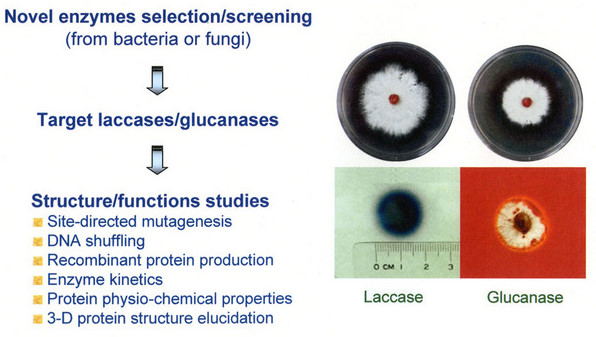Enzyme Biotechnology
Development of key and innovative enzyme technologies is an important research area for the applications in bioagricultural industry worldwide. After joining the“World Trade Organization”and the subsequent opening of our market to foreign agricultural products, the development of agriculture in Taiwan faces a big challenge. To continue to be able to compete successfully in sphere global market, Taiwan needs not only to appropriately and extensively promote Taiwanese agricultural products but also to improve or develop new agricultural products to generate additional economic value to agriculture in Taiwan. As a part of this push, ABRC has formed a cross-disciplinary research team aimed at discovery or creation of novel enzymes for various bioindustrial applications, such as bioenergy, bioremediation, biopulping, or food and feedstock production. The following research directions are being pursued: (1) Development, protein engineering, and mass production of existing enzymes for improvement of agricultural products, or for new function or usage; and (2) Discovery of novel enzymes from plant or microbial resources valuable for industrial application.
In recent years, novel technologies in next-generation DNA sequencing, functional genomics, rational design, and directed evolution approaches have substantially enhanced the potential for discovering or creating novel industrial enzymes. In our research team, we have been conducting in identification of novel lignocellulosic-degrading enzymes, e.g., laccases, cellulases (endo-glucanases, exo-glucanases, β-glucosidases) and hemicellulases (lichenases and larminarinases) from indigenous fungal species, bacteria, or plants for the use in biopulping, bioremediation, or converting biomass into bioenergy, etc. The structure-function relationship of target enzymes are being elucidated to shed light on the structural role and function of protein glycosylation in laccases and to provide important information for further improvement of enzyme properties; in addition, genomic and biotechnological approaches are employed to develop cost-effective bioprocess for bioethanol production from lignocelluose.
ABRC continues to recruit faculty in the research fields of plant biochemistry, enzymology, metabolic engineering, and microbial functional genomics and genetics. Through our extensive collaboration with other research institutes or centers within the Academy, including the Institute of Biological Chemistry, the Genomics Research Center, and the Biodiversity Research Center, ABRC will continue to be internationally competitive in this important research area.


